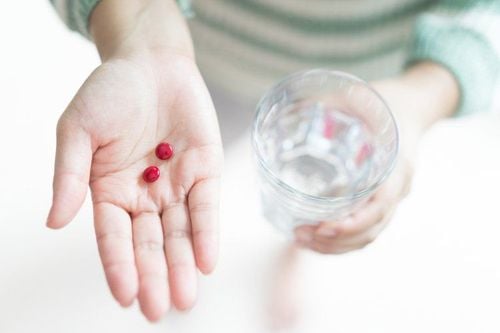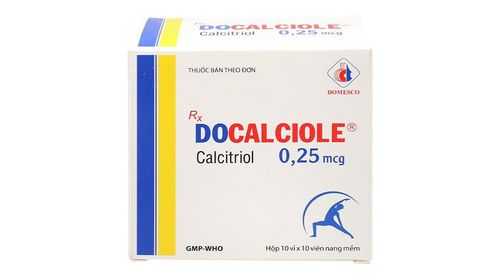This is an automatically translated article.
Risenate is a drug on the list of drugs affecting bone metabolism, containing alendronic acid as the main ingredient and used to treat osteoporosis in postmenopausal women. Learn the uses, ingredients and usage right in the article below.1. What effect does Risenate have?
Risenate is prepared in the form of film-coated tablets with a content of 70mg and packed in a box of 1 blister x 4 film-coated tablets. Risenate is indicated for use in the treatment of osteoporosis in postmenopausal women.
Pharmacodynamics:
Risenate contains alendronate, a drug that inhibits specific bone resorption. Alendronate selects and accumulates at active sites of bone resorption, inhibiting the activity of osteoclasts.
Bone mass in the spine will increase significantly if the patient is treated with alendronate, the femoral neck and trochanter are similar. If alendronate therapy is discontinued after 1-2 years, the increase in bone mass cannot be maintained. Therefore, patients must continue to receive daily treatment to maintain the effectiveness of the treatment.
Pharmacokinetics:
Absorption: Mean oral bioavailability in women is 0.7% at a dose of 5 - 40 mg, taken after 1 night of fasting and 2 hours before a breakfast. Distribution: The Alendronate component in Risenate is transiently distributed in soft tissues, then redistributed to bone or excreted in the urine. Binding to plasma proteins is about 78%; Metabolism and Elimination: The drug, after intravenous injection with a single dose of 10mg, has a renal clearance of 71mL/min. The drug's half-life is over 10 years, due to the release of alendronate from the bone.
2. Dosage and how to take Risenate
2.1.Dosage The recommended dose of Risenate is 70mg/week; Elderly people, people with liver failure, mild to moderate renal impairment do not need to adjust the dose. There are no dosage recommendations for patients with severe renal impairment. Note: The above dosage is for reference only. For a specific dose, patients need to consult a doctor or pharmacist, because the dose depends on the condition and the progress of the disease.
2.2.How to take Risenate is taken orally. Patients need to take the whole tablet with 180-240ml of cooled boiled water, do not use mineral water or other drinks and should take it at least 30 minutes before eating. After taking the medicine, the patient should not lie down for 30 minutes to allow the medicine to enter the stomach easily and reduce the possibility of esophageal irritation.
Note: Do not take medicine before going to bed.
3. Note the use of the drug Risenate
3.1. Contraindications Risenate should not be used in the following cases:
People with esophageal abnormalities that slow down esophageal emptying, for example narrowing or spasm of the esophageal sphincter, Inability to stand or sit upright for at least 30 minutes; People with hypersensitivity to any ingredient of the drug; People with hypocalcemia. 3.2. Caution People with gastrointestinal disease such as dysphagia, esophageal disease, gastritis, duodenitis or ulcer should be cautious when using alendronate, because the drug irritates the gastrointestinal mucosa. The drug does not affect the ability to drive and use machines. Do not use alendronate during pregnancy. Use with caution in women who are breastfeeding.
4. Side effects of the drug Risenate
Undesirable effects (ADRs) of Risenate are usually mild and do not require discontinuation of the drug. Some side effects are recorded as follows:
Common ADR: Occurrence of symptoms such as headache, flatulence, gastroesophageal acid reflux, esophageal ulceration, dysphagia and abdominal distension; Uncommon ADR: Skin rash, gastritis. During the use of the drug, if the patient experiences unpleasant side effects, they should inform the doctor about the condition for appropriate guidance.
5. Risenate drug interactions
Should not be combined with estrogen, as safety and efficacy when used concurrently have not been established. In case calcium supplements and antacids are needed, it should be taken half an hour apart from alendronate to reduce absorption of alendronate. Caution should be exercised in combination with non-steroidal anti-inflammatory drugs, because of an increased incidence of gastrointestinal side effects at doses higher than 10 mg/day of alendronate. Risenate is a drug on the list of drugs that affect bone metabolism, containing the main ingredient alendronic acid and used to treat osteoporosis in postmenopausal women. Patients need to use the drug exactly as directed by the doctor to achieve high efficiency and avoid unwanted side effects.
Follow Vinmec International General Hospital website to get more health, nutrition and beauty information to protect the health of yourself and your loved ones in your family.
Please dial HOTLINE for more information or register for an appointment HERE. Download MyVinmec app to make appointments faster and to manage your bookings easily.













